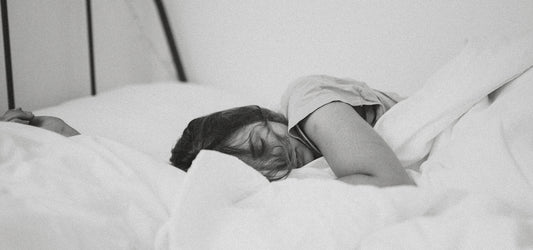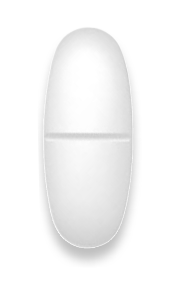How can you sleep better?

It is recommended that adults get between seven and nine hours of normal sleep per day. However, this can be difficult for many due to stress, anxiety, work commitments and a host of other factors. A study conducted in 2019 found that 62% of adults struggle to sleep well, getting just 6.8 hours of sleep per night. 2 The Covid-19 outbreak has changed these figures significantly. People in the UK now spend 18 minutes more a day at work and 23 minutes less sleeping. 3
Unfortunately, lack of sleep is associated with various health risks and a negative effect on general well-being. 4 Mild symptoms include feeling tired, irritability and difficulty concentrating the next day. On the other hand, chronic sleep deprivation is linked to serious medical conditions and health problems such as shortened lifespan, diabetes, high blood pressure, heart disease and depression. 5
So what can you do to develop good sleep hygiene and get a full night's sleep? We recommend focusing on the following points:
- Sleeping environment
- Sleep routine
- Sleeping habits
The sleeping environment
Sleep duration and quality are affected by external factors such as bright lights and loud noises. 6 Therefore, you should make sure that the conditions in your bedroom help you relax and fall asleep more easily. These tips can help:
- Invest in a quality mattress, as well as comfortable pillows and bedding. It pays to choose a mattress that provides adequate back support and won't cause back pain that can interrupt your sleep. One study found that medium-firm mattresses are optimal for promoting sleep comfort and spinal alignment. 7 Your cushion and bedding also affect your sleep 8 and should be comfortable but not too warm.
- Use blackout curtains or a sleep mask. Outdoor lighting at night affects how we fall asleep and has been linked to a delay in sleep and wake-up times as well as a reduction in sleep duration. 9 Bright light also affects our circadian rhythm. 10 For these reasons, it is advisable to schedule your sleep phase during a time of total darkness.
- Bring peace and quiet into your bedroom. Noise can disrupt your sleep. 11 Even if it is not possible to completely eliminate all ambient noise, such as if you live in a busy part of town, try to muffle loud noises with earplugs or a white-noise machine.
- Don't set your temperature too high, but don't set it too low either. Naturally, the optimal temperature for falling asleep varies from person to person. However, studies have shown that rapid temperature changes and sweating can affect sleep quality. 12 The recommended temperature range is between 18°C and 24°C. 13
- Use a mild, calming scent. Aromatherapy can have a very calming effect and help you fall asleep. Lavender in particular has been shown to help with restlessness and sleep disorders and has a positive effect on health and well-being. 14
The sleep routine
A good sleep routine is an important part of good sleep hygiene and can help you sleep better. 15 It essentially involves the following steps:
- Set a set time to go to bed and get up. Of course, this isn't always possible for on-call or shift workers, but the sleep tips listed in this article should still help you. If you constantly feel tired or exhausted when you wake up, and have trouble concentrating the next day, try B・SYNC ON , a clinically tested nutritional supplement that makes the waking process easier.
- Try to get seven to eight hours of sleep. As mentioned earlier, this is the recommended amount of sleep per day for an adult. 16
- Avoid naps after 3 p.m. While a short nap of less than an hour can improve cognitive performance, a late afternoon nap can impair the ability to fall asleep at night. 17
- Avoid major changes in your sleep schedule. Most people can set their internal clock back by a maximum of one to two hours. However, it is still advisable to stick to your sleep schedule whenever possible, even on weekends. 18
- Develop an evening routine before going to bed. This point will be discussed in more detail in the next chapter when it comes to developing healthy sleep habits. Examples include avoiding electronic devices in bed 19 , dimming the lights, taking a warm bath, listening to calming music or drinking herbal tea to gently prepare the body and mind for sleep.
Sleeping habits
There are many things you can do during the day and before bed to help you get the best sleep possible. These include:
- Avoid using electronic devices one to two hours before bedtime. Most computers, cell phones, tablets, and televisions emit blue light, which negatively affects sleep and circadian rhythms. 20 Blue light can also suppress the production of melatonin, a hormone that promotes sleep. 21
- Avoid caffeine, alcohol, nicotine or other stimulants before bed. Caffeine blocks the adenosine receptors active in the brain that make it easier to fall asleep, 22 while alcohol has been shown to negatively affect sleep quality. 23
- Avoid large meals before bed. These can cause stomach upset, which can disrupt your sleep. 24
- Exercise. Daily physical activity has been found to improve sleep quality in adults, 25 although it is advisable to avoid exercising close to bedtime. 26 If you want to exercise late in the day, avoid workouts and try light exercise like yoga to relax your muscles. 27
- Practice stress management . While this is easier said than done, it can help alleviate some of the symptoms of stress such as racing thoughts, eating more or less than usual, drinking or smoking more than usual - all of which negatively affect your sleep. 28
- Reserve your bedroom for sleep and physical intimacy. We make strong associations between sleep and the bedroom. 29 However, these associations can be disrupted by engaging in other stressful activities in the bedroom, which in turn can negatively impact our ability to get a good night's rest. 30
- Try clinically proven supplements. B・SYNC ON is a sustained release supplement that helps you wake up in the morning with ease, without feeling tired or exhausted. It has no side effects, although you should talk to your GP first if you are taking sleeping pills. It can be taken daily or as needed and can help align your body clock with your circadian rhythm.
What to do if you still can't fall asleep?
Even if you have excellent sleep hygiene, there may be times when you have trouble sleeping. Try not tossing and turning and forcing yourself to sleep, as this can have the opposite effect. Get out of the bedroom and read something or use relaxation techniques such as deep breathing and meditation. Keep a sleep diary, as this can help you identify any underlying conditions that are affecting your ability to sleep. 31
If you find that no matter what you do, you still aren't getting enough sleep, you should see a doctor who can advise you on sleep disorders and sleep problems and tell you what you can do to improve your sleep patterns.
If you're having trouble adjusting your sleep schedule, click here to learn more about how B・SYNC ON can help.
Sources
- https://www.sciencedirect.com/science/article/abs/pii/S2352721815000157
- https://www.usa.philips.com/c-dam/b2c/master/experience/smartsleep/world-sleep-day/2019/2019-philips-world-sleep-day-survey-results.pdf
- https://www.statista.com/chart/25158/change-in-time-spent-activities-in-lockdowns-gb/
- https://www.nhs.uk/live-well/sleep-and-tiredness/why-lack-of-sleep-is-bad-for-your-health/
- https://pubmed.ncbi.nlm.nih.gov/28477772/
- https://pubmed.ncbi.nlm.nih.gov/30509635/
- https://pubmed.ncbi.nlm.nih.gov/29073401/
- https://pubmed.ncbi.nlm.nih.gov/30509635/
- https://academic.oup.com/sleep/article/39/6/1311/2454030?login=true
- https://link.springer.com/article/10.1007/BF00584704
- https://pubmed.ncbi.nlm.nih.gov/30018067/
- https://pubmed.ncbi.nlm.nih.gov/30509635/
- https://www.nhs.uk/live-well/sleep-and-tiredness/how-to-get-to-sleep/
- https://www.ncbi.nlm.nih.gov/pmc/articles/PMC3612440/
- https://journals.lww.com/nsca-scj/FullText/2013/10000/Sleep,_Recovery,_and_Athletic_Performance___A.8.aspx
- https://www.sciencedirect.com/science/article/abs/pii/S2352721815000157
- https://www.nhlbi.nih.gov/files/docs/public/sleep/healthysleepfs.pdf
- https://www.nhlbi.nih.gov/files/docs/public/sleep/healthysleepfs.pdf
- https://journals.lww.com/nsca-scj/FullText/2013/10000/Sleep,_Recovery,_and_Athletic_Performance___A.8.aspx
- https://www.ncbi.nlm.nih.gov/pmc/articles/PMC4734149/
- https://www.hopkinsmedicine.org/health/wellness-and-prevention/melatonin-for-sleep-does-it-work
- https://www.ncbi.nlm.nih.gov/pmc/articles/PMC6292246/
- https://pubmed.ncbi.nlm.nih.gov/29549064/
- https://www.nhlbi.nih.gov/files/docs/public/sleep/healthysleepfs.pdf
- https://pubmed.ncbi.nlm.nih.gov/28276627/
- https://www.nhlbi.nih.gov/files/docs/public/sleep/healthysleepfs.pdf
- https://www.nhs.uk/live-well/sleep-and-tiredness/how-to-get-to-sleep/
- https://www.nhs.uk/every-mind-matters/mental-health-issues/stress/
- https://www.nhs.uk/live-well/sleep-and-tiredness/how-to-get-to-sleep/
- https://www.nhs.uk/every-mind-matters/mental-health-issues/sleep/
- https://www.nhs.uk/live-well/sleep-and-tiredness/how-to-get-to-sleep/









